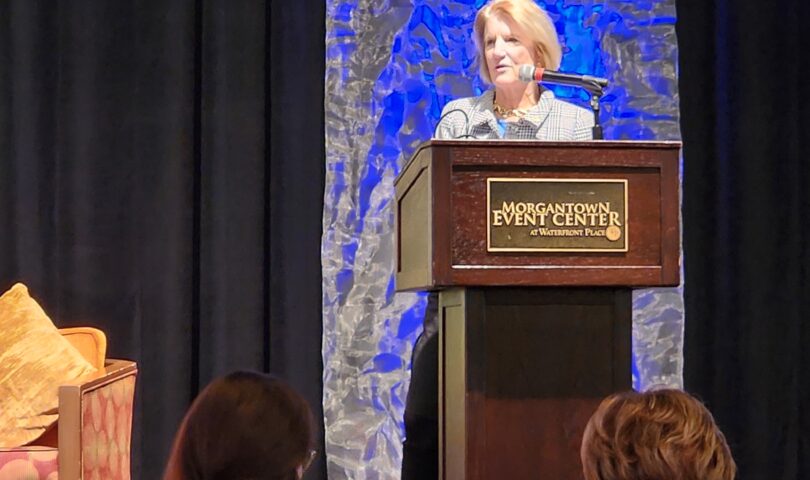(This story has been updated to include information about new legislation by Sen. Amy Klobuchar.)
MORGANTOWN – If you’re stressed about the potential demise of TikTok (or maybe delighted), don’t be, Sens. Joe Manchin and Shelley Moore Capito said Wednesday. It will continue – under a different owner and – maybe, who knows – a different name.
The senators both mentioned the TikTok bill pending in Congress during separate appearances at Wednesday’s Focus Forward symposium, organized by the West Virginia Public Education Collaborative and the Claude Worthington Benedum Foundation.
The symposium’s topic was West Virginia’s Digital Destiny. Capito spoke first, on “Embracing Digital Connectivity.”

A big area of concern, she said, is how to protect our kids, and that brings TikTok to mind. The bill passed the House 352-65 and awaits its fate in the Senate. Formally called the Protecting Americans from Foreign Adversary Controlled Applications Act, it would force Chinese-owned ByteDance to sell TikTok or face a ban. Despite the app’s popularity, there is a broad consensus the Chinese Communist Party employs it to gather date on its users.
Her office has been getting deluged with calls, she said, from distressed young teens and pre-teens. Some senators, she said, have received death threats that stemmed from a TikTok challenge.
“We’re not trying to stop TikTok,” she said, noting they’re just trying to make sure it is safe.
The threat challenge makes clear how much of an impact this platform has on youths. And it raises the question of how many other things the Chinese could manipulate.
Capito said she will vote for the bill and believes it will be sold.
Manchin’s comments were titled, “Cyber Forces: How to Stay Secure at Home and Abroad.” He addressed the bill in the general context of the need to put guardrails on artificial intelligence in a safe and timely way.
“We’re not getting rid of TikTok,” he said. “We’re just getting rid of China’s ownership and control of TikTok.”
China, North Korea, Russia and Iran are four “countries of concern” that are understood to be making efforts to access American’s personal data and governmental data. Manchin said we can’t have social media based in countries of concern.
On other topics, Capito reminded the audience that the state is behind the rest of the nation in terms of broadband connectivity and usage. The bipartisan infrastructure act sets aside more than $1 billion to get the unserved and underserved connected, but the money is not here yet. The state broadband council is still working on its plan so some 271,000 eligible households can get connected.
Capito also said she supports a bill led by Sen. Amy Klobuchar, D-Minn., aimed at curbing the use of generative AI in political ads – to digitally impersonate a real politician – employed to influence the outcome of an election. The Artificial Intelligence Scam Prevention Act awaits introduction. A prior Klobuchar bill, introduced last September, the Protect Elections from Deceptive AI Act, has not moved.
The problem with such regulation, she said, is technology tends to advance faster than regulation can keep up with it.
Manchin said, “If we do AI and do it right, we can basically put the guardrails on.” He mentioned the foreign countries of concern and said most cyberattacks come from Russia.
“We have challenges no one has ever seen before.” Without proper guardrails, AI is going to either control, dictate or destroy, he said. But if we complete good regulation in a timely way, before it’s too widespread, it can benefit citizens and commerce.
One thing standing in the way, he said, is divisive party politics, with lawmakers putting their factions and their reelection bids ahead of the public good.
“The global AI race is just beginning,” he said. “The United States must remain at the forefront.”
Email: dbeard@dominionpost.com




